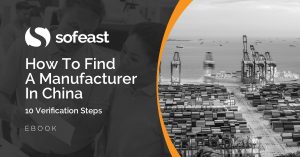From time to time, I hear from a company that works with a ground agent in China, and they basically tell me two things:
- The agent did a relatively good job lining up suppliers, communicating requirements, and generally ironing out most issues. (That makes sense — otherwise, the importer switches to another agent or to another approach.)
- After the initial burst, the agent feels entitled to a commission of X% and is resting on her laurels, not challenging factories, not looking for new sources, not trying to cut costs. In the long run, that’s simply unsustainable, but they don’t see it that way.
There are actually 2 distinct situations here:
- Do you wire money to the manufacturers, and then a separate commission to your ground agent? Then, they are a commissioned sourcing agent.
- Or do you pay your agent, who then dispatches payments to the factories? That makes them a trading company.
There is nothing inherently bad about any of these models, but their implications are quite different.
Situation 1: You are working with a commissioned sourcing agent
You probably pay them somewhere between 4% and 10% of the FOB amount. They are usually just an individual. Whether that individual does 80-hour weeks or is doing nothing, the money gets paid.
Where is the incentive for them to cut costs? Nowhere.
In a previous article, I found a similar example (Why a Real Estate Agent May Skip the Extra Mile) published in the New York Times.
A recent study by two University of Chicago economists suggests that home sellers should regard agents with some caution. The study does not suggest that agents are inherently untrustworthy. Rather, it says, the housing market remains inefficient, and the incentives for agents to maximize profits for their clients aren’t powerful enough.
How does it play out?
If a home sells for $500,000, the agent personally receives $7,500. Not bad for what may be just a few days of work. If the agent works for an additional week and urges the seller to hold out for $515,000, that’s an extra $15,000 for the seller, but only an extra $225 for the agent. Because every additional dollar throws only a penny and a half into the pocket of the agent, the economists reason, the agent may push clients to accept lowball offers.
I have heard importers complain about the same thing. Prices only go up. The agent doesn’t actively hunt for new suppliers, for operational improvements at the current suppliers, for packaging optimizations, etc. because it would create more work for her.
On the contrary, the agent justifies the price hikes. She rationalizes that cutting costs would be quite difficult, that it might offend the suppliers, etc.
I wrote more about this behavior in this article about sourcing agents.
If that’s the case, and if the buyer has never promised anything to the agent, it might be time to cut her off…
How to stop working with a commissioned agent?
Go and visit the factories with another Chinese speaker. Assess their allegiance to the agent. In most cases, the manufacturers won’t care if they are left to deal directly with you. The risk is low.
Things might get weird if the agent chose some of his family members (it happens — did you think it’s all about the search for competencies in China?). And they might go wrong if the agent decides to sell your product to your competitors or to your customers. That’s the main risk.
Situation 2: You are working with a trading company
They are your supplier. They are working for themselves, not for you. You probably don’t know what their margin is.
The fact is, you are renting their supply chain. They have lined up the suppliers and they consider it is all theirs… and, in fact, they are right about that! Cutting them off is not ethical.
The first questions I’d ask are:
- Are prices actually out of sync with the market? Not all trading companies make high margins.
- Is/are the manufacturer(s) doing a good job?
- Is the trading company itself causing issues (misunderstandings, delays…)?
If you decide you want to move away from this whole arrangement, the next set of questions would generally be as follows:
- Do I, as the buyer, have the right to take the exact same product I have been buying from the trader and have it made somewhere else? If I have been buying from an ODM, I can’t do that unless I re-develop a product with significant adjustments.
- Can other factories make the same products? Does it require a long development? Does it call for expensive engineering (tooling etc.)?
There are many types of situations here. I wrote more about it in this article about trading companies.
Some buyers, at this stage, simply want to jump over the trader and work directly with the same manufacturers. It is a betrayal, yet it is quite common.
How to stop working with a trader
Before you do that, think about the worst that can happen. Here are two examples.
- If you buy 100,000 USD a year from factory XYZ but the same trading company (who always has staff going in and out of the factory) buys 2 million USD a year from XYZ, there is a risk the factory ends up giving up on your order at the worst moment.
- The trader, who is probably more apt at marketing & sales than most factories, might reach out to your competitors or your customers and sell them your products.
For importers with high volumes, I usually advise to develop backup manufacturers on the side and to drop the trading company gradually. It is usually the best thing to do.
—
What do you think? Have you see such cases, and what would you generally advise?
Are you wondering how to find a manufacturer in China who is well-suited to your needs and can also deliver on their promises?
Sofeast has developed 10 verification steps to help you find the right manufacturer. They’re shared in this FREE eBook: “How To Find A Manufacturer In China: 10 Verification Steps.”
It covers:
- Background checks
- Manufacturing capabilities
- Quality system auditing
- Engineering resources
- Pricing, negotiation, & contracts
- …and much, much more
Just hit the button below to get your copy:


